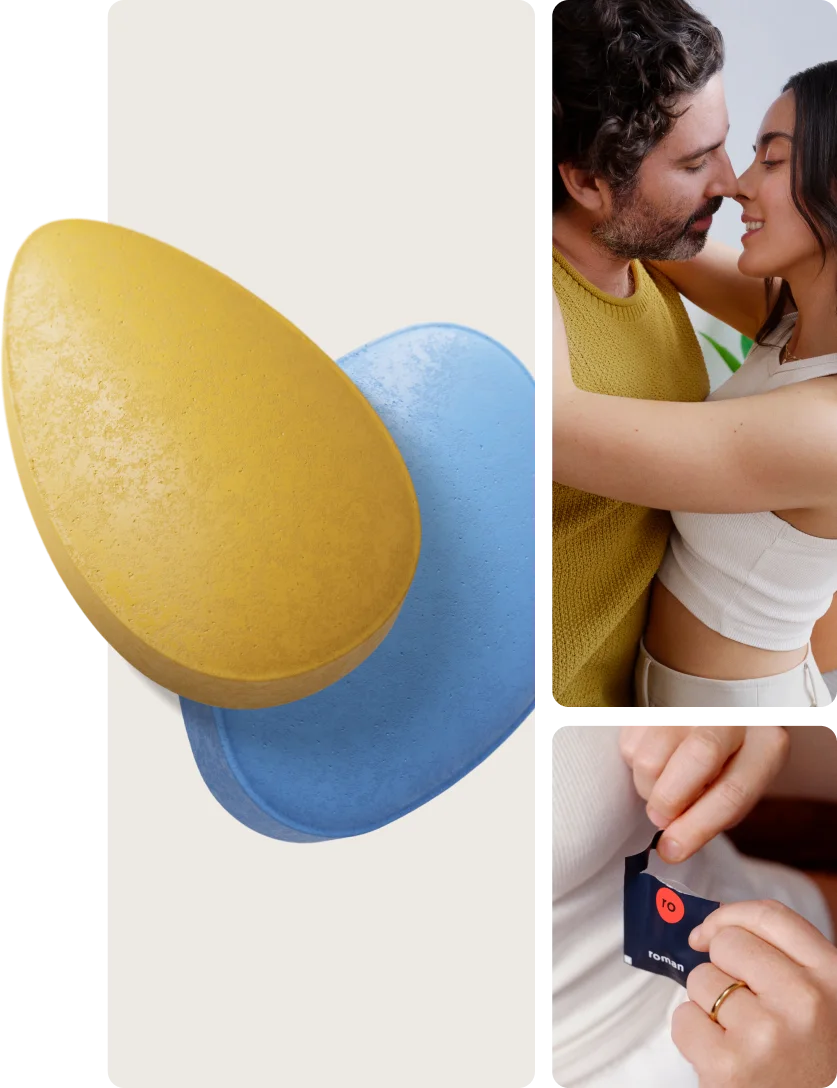
American men experience erectile problems (Sooriyamoorthy, 2021).
Erectile dysfunction
Getting hard is the most obvious sign of sexual arousal for those with penises. It’s a physical response to chemical reactions in the body.
ED medications, such as Viagra (generic name sildenafil; see Important Safety Information) or Cialis (generic name tadalafil; see Important Safety Information), are considered the most effective way to treat ED. But there are other ways to help increase the strength of your erections with just a few simple lifestyle changes.
Here’s some simple ways you can get harder naturally:

Exercise more frequently
You’ve heard this one before: Exercise is good for you. And while it may seem like boring medical advice to tell you to exercise regularly, cardiovascular health and erections are intimately linked.
The blood vessels in your penis are smaller and narrower than the arteries in other parts of your body. That means that the first sign of high blood pressure, heart disease, high cholesterol, and clogged arteries may not be a stroke or a heart attack. It could be erectile dysfunction.
Adding a few minutes of exercise to your day can add years to your life—literally. And if that exercise results in stronger, more frequent erections, that’s even better.
Change your diet
To be fair, no food can fix erectile dysfunction (ED).
Still, a healthy diet can help manage risk factors for atherosclerosis, obesity, high blood pressure, and diabetes, which may also help stave off erection problems. Some research has shown that fruits, vegetables, and healthy fats are associated with a lower risk of ED (Di Francesco, 2017).
And the cool thing about eating a healthy diet is that you don’t necessarily have to lose weight to get better erections. You just have to improve the quality of the food you eat. The key to making lasting dietary changes is small moves.
Gradual changes will help your taste buds and habits adjust to a new reality without even realizing you’re eating healthier.
Eat more of these:
Fruits
Vegetables
Whole grains
Legumes
Eat less of these:
Red meat (processed and unprocessed)
Processed food
High sugar drinks (like soda)
Limit alcohol and smoking
In the long term, heavy alcohol use increases the risk of liver disease, increasing the risk of ED. In the short term, it depresses your central nervous system, decreasing overall arousal. As a general rule, depressants are bad for sexual performance (Sooriyamoorthy, 2021).
For most men, having one drink won’t impact sexual performance in any meaningful way. However, it’s a good idea to limit yourself to two drinks before sexual activity, especially if you’ve struggled with erectile dysfunction. And drinking heavily while taking ED medication is not advised. Meanwhile, using tobacco products affects the quality of your erections in a negative way (Sooriyamoorthy, 2021).


Other options
These lifestyle factors are good for your health anyway, but if you’re still experiencing ED, and if you feel ready, don’t be afraid to try ED meds (as recommended by your healthcare provider)—they’re safe and effective.
Disclaimer If you have any medical questions or concerns, please talk to your healthcare provider. The articles on Health Guide are underpinned by peer-reviewed research and information drawn from medical societies and governmental agencies. However, they are not a substitute for professional medical advice, diagnosis, or treatment.
References
Di Francesco, S. & Tenaglia, R. L. (2017)
Di Francesco, S. & Tenaglia, R. L. (2017). Mediterranean diet and erectile dysfunction: a current perspective. Central European Journal of Urology, 70(2), 185–187. doi: 10.5173/ceju.2017.1356. Retrieved from https://pubmed.ncbi.nlm.nih.gov/28721287/
Feldman, H. A., Goldstein, I., Hatzichristou, D. G., Krane, R. J., & Mckinlay, J. B. (1994)
Feldman, H. A., Goldstein, I., Hatzichristou, D. G., Krane, R. J., & Mckinlay, J. B. (1994). Impotence and Its Medical and Psychosocial Correlates: Results of the Massachusetts Male Aging Study. Journal of Urology, 151(1), 54–61. doi: 10.1016/s0022-5347(17)34871-1. Retrieved from https://pubmed.ncbi.nlm.nih.gov/8254833/
Ibrahim, A. (2018)
Ibrahim, A. (2018). Erectile dysfunction and ischaemic heart disease. European Cardiology, 13(2), 98–103. doi: 10.15420/ecr.2017.21.3. Retrieved from https://www.ncbi.nlm.nih.gov/pmc/articles/PMC6331774/
Selvin, E., Burnett, A. L., & Platz, E. A. (2007)
Selvin, E., Burnett, A. L., & Platz, E. A. (2007). Prevalence and risk factors for erectile dysfunction in the US. The American Journal of Medicine, 120(2), 151-157. doi: 10.1016/j.amjmed.2006.06.010. Retrieved from https://www.amjmed.com/article/S0002-9343(06)00689-9/fulltext
Sooriyamoorthy, T. & Leslie, S. W. (2021)
Sooriyamoorthy, T. & Leslie, S. W. (2021). Erectile dysfunction. [Updated August 12, 2021]. In: StatPearls [Internet]. Retrieved on Dec. 7, 2021 from https://www.ncbi.nlm.nih.gov/books/NBK562253/
Tsujimura, A. (2017)
Tsujimura, A. (2017). Atherosclerosis is associated with erectile function and lower urinary tract symptoms, especially nocturia, in middle-aged men. Prostate International, 5(2), 65–69. doi: 10.1016/j.prnil.2017.01.006.
